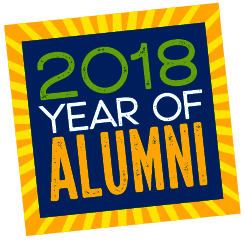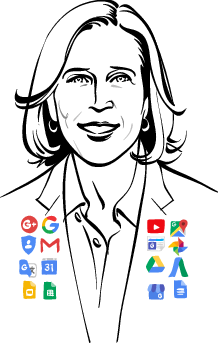In 1992, when Susan Wojcicki landed in an upper-division finance course taught by UC Santa Cruz Distinguished Professor of Economics Dan Friedman, she found herself near the bottom of the class.
Above: Susan Wojcicki delivering the keynote at YouTube’s 2017 Brandcast event in New York, photo courtesy YouTube
“She didn’t have the math,” he continued, “the economics.”
“She was smart, but she didn’t have the background, the technical chops,” said Friedman of the woman who would go on to become CEO of the media giant YouTube and be ranked No. 6 on Forbes’s 2017 list of “The World’s 100 Most Powerful Women.”
It’s a memory that draws a quick chuckle from Wojcicki, 50, who arrived at UC Santa Cruz with a degree from Harvard University in history and literature.
By the end of the quarter, however, Friedman remembers, Wojcicki (M.S. ‘93, applied economics) had moved to near the top of the group.
 “When I came to UC Santa Cruz, I didn’t know much about economics, but I was able to jump in and learn the material,” says Wojcicki at YouTube’s San Bruno headquarters. “Running a tech company is a lot like that. You have to be willing to always be learning and asking questions and thinking critically. “You have to be willing to accept you don’t have all the answers and be learning every single day.” Relaxed and personable, Wojcicki talks about success, about what drives her, and about bringing more women into the world of high tech. She touches on the challenges facing her company, one of her mostdifficult moments, and explains how her upbringing helped her and her two sisters—one sibling, Janet Wojcicki, is an associate professor of pediatrics and epidemiology at UC San Francisco, and the other, Anne Wojcicki, is cofounder and CEO of the genetics-testing company 23andMe—become strong, confident women.
“When I came to UC Santa Cruz, I didn’t know much about economics, but I was able to jump in and learn the material,” says Wojcicki at YouTube’s San Bruno headquarters. “Running a tech company is a lot like that. You have to be willing to always be learning and asking questions and thinking critically. “You have to be willing to accept you don’t have all the answers and be learning every single day.” Relaxed and personable, Wojcicki talks about success, about what drives her, and about bringing more women into the world of high tech. She touches on the challenges facing her company, one of her mostdifficult moments, and explains how her upbringing helped her and her two sisters—one sibling, Janet Wojcicki, is an associate professor of pediatrics and epidemiology at UC San Francisco, and the other, Anne Wojcicki, is cofounder and CEO of the genetics-testing company 23andMe—become strong, confident women.
Learning early to seek impact
Wojcicki grew up on the bucolic Stanford University campus, the oldest of three girls. Her father, Stanley Wojcicki, is a particle physicist and was chairman of the Stanford Physics Department. Her mother, Esther Wojcicki, is a journalism teacher and founder of the landmark Palo Alto High School Media Arts Center, which counts some 600 students working in and studying media from newspaper to video production.
“We were surrounded by a lot of talented people who were focused on their passion and how they could make a difference, and that really impacted me,” Wojcicki says of those early years. “It inspired me to not be focused on some of the traditional metrics of success—fame and income—and rather focus on how do you do something that has high impact, something that is meaningful and interesting.”
According to articles, the Wojcicki household was a place where putting on a jacket was preferable to turning up the heat, where the kids were taught to question assumptions, and where an advanced degree was like the sunrise: expected.
In fact, Wojcicki’s sister Anne once joked to columnist Maureen Dowd that, in her family, “you’re only a viable fetus once you have your Ph.D.”
“Our parents encouraged us to think outside the box and to think of different solutions,” Wojcicki says. “They taught us to think critically and not just follow whatever others are doing. They taught us to focus on a career of giving back and one that was in a challenging area.”
It was a twist of fate that landed her in tech.
The summer after her junior year at Harvard, Wojcicki says, she got a temp job at a Silicon Valley startup. The vibe at that small office and the hint of what technology could become prompted her to take a computer science course when she got back to Harvard. She was hooked.
In 1991, she arrived at UC Santa Cruz, which was not only close to Silicon Valley but also was one of the few places at the time to offer a master’s program in economics.
Not only did she earn her master’s but she also met her husband, Dennis Troper (M.S. ’93, applied economics; now a product director at Google), and got what she calls “a strong foundation in analytical thinking.”
“What I learned (at UC Santa Cruz) was a lot of key economic principles and a lot of quantitative and analytical skills that I use every day at work,” she says.
Seven years later, two Stanford computer science students, Larry Page and Sergey Brin, asked Wojcicki how much she would charge to rent the garage in her 2,000-square-foot Menlo Park house so they could start a company. She told them $1,700 a month—plus a security deposit.
Page and Brin would go on to found the search-engine giant Google in that space, and, by 1999, Wojcicki quit her job at Intel to join the two men as Google’s first marketing manager and employee No. 16. She also was four months pregnant.
Some people said she was crazy, but “the idea of helping people find information and helping people to become empowered by being able to look up information in new ways resonated with me,” says Wojcicki of her decision to join the fledgling company. “My grandmother (Jane Wojcicki) was a librarian at the Library of Congress, and it seemed like this was actually a continuation of some of her work.”
Plus, the internet was beginning to explode.
“It was really clear to me that there was so much opportunity there and the internet was going to change everything,” she says.
Wojcicki rose through the ranks at Google and, in 2006, was instrumental in the company’s $1.65 billion purchase of what was then a small online video sharing service called YouTube. In 2014, she was named CEO of the company, now estimated to be worth $80 billion.
A voice for women in tech

Illustration by Kathryn Rathke
Wojcicki has a corner office at YouTube’s light-filled headquarters off busy Highway 280 in San Bruno. But any hint at the trappings of power ends there. Her desk is a simple long table with a computer monitor, a S’well water bottle, and a scattering of Post-it notes. The only thing dividing her office and any employee or visitor on their way to the free juice and coffee bar or the office’s giant, one-story red slide is a trippy art piece featuring an array of YouTube stars: Lilly Singh, the Fung Bros., Anna Akana. Across the open hallway is a room for nursing mothers.
That’s a lot of what you need to know about her.
Wojcicki describes herself as both practical and creative, and is a strong voice for the inclusion of women in the world of tech. Currently, only 26 percent of tech jobs in the United States are held by women, according to the National Center for Women and Information Technology.
At YouTube, the percentage of women working for the company has risen from 24 to nearly 30 percent under Wojcicki’s guidance.
“One of the things we’ve done (to boost diversity in the workplace) is to really increase our recruiting,” Wojcicki says. “We make sure we cast a wide net to find people who may not have applied but are qualified to do the work.”
The company also encourages and funds employee resource groups dedicated to creating supportive communities around culture, gender, race, or sexuality, and has a generous, 18-week family leave program.
“When we extended our family leave from 12 weeks to 18, we saw the rate at which new moms left (employment at YouTube) was cut in half,” says Wojcicki, who is mom to five children.
The way to get more women into the workplace is also to make sure people in power “extend their privilege,” Wojcicki wrote in a highly personal 2017 op-ed in Vanity Fair magazine, in answer to a memo from a Google software engineer who said the low number of women in tech was due to biological differences and not discrimination.
“I would say I’ve been really lucky because I’ve had good mentors and I work at a good place, but I don’t want to say it’s been perfect,” Wojcicki says.
There were the men who interrupted her or ignored her at meetings, business leaders who addressed her male junior colleagues instead of her, and the time, not too long after she was named CEO of YouTube, that she discovered she’d been left off the guest list for an important invitation-only conference of the top people in media and tech.
“I started to question whether I even belonged at the conference,” Wojcicki wrote.
But instead of accepting the snub, she called on her mentor, the late Bill Campbell, a legendary figure in Silicon Valley. The next day she received her invitation.
“Most helpful for me is to have good friends in the office so I feel like I have a support system, to have good mentors, and, lastly, to be really persistent,” she says.
Wojcicki’s role in the top spot at YouTube hasn’t been without challenges. There was the need to respond to reports of Russian operatives exploiting Google, Facebook, and YouTube to spread disinformation in advance of the 2016 presidential election, and a Department of Labor investigation into gender-based pay gaps at YouTube’s parent company, Google, which Google has denied.
There were also products Wojcicki championed that didn’t go anywhere.
“One of the key lessons is that it is just as important to be honest with yourself about what’s working and what’s not working and to not be emotional about it,” she says.
And one of her most difficult moments?
Wojcicki says it was the decision, while she was at UC Santa Cruz, to step away from the goal she’d set for herself to get a doctoral degree.
“I had grown up on a campus where everyone had Ph.D.s, and I had this moment where I realized that, as much as I liked economics, I wanted to work in the tech field, and that was a very hard moment for me,” she says. “I was very emotional about it.”
Right now, Wojcicki says, her top priority is expanding YouTube’s educational value—videos that teach a viewer everything from how to create an Excel spreadsheet to how to tie a knot.
“We’ve got a billion views a day of learning-related materials,” she says. “It’s something we will continue to invest in.”
And that, Wojcicki says, sums up the reason she comes to work every day. Her job allows her to create in new ways “which, for me, is something very fundamental,” she says.
It’s also how she measures success.
“I would define success in terms of giving back to the world and making an impact and making people’s lives better, and I think the work I’ve done has changed and improved people’s lives,” Wojcicki says.
“And I don’t think it’s over. I think there’s a lot of work still to be done.”

